Joshiraku 05 – notes and the like This entry was posted by Vale.
The official lyrics of the opening have been released just in time for episode five, so I fixed a few lines. The fixes are as follows:
- Gankyou’s line (一でも六でもナイン ichi de mo roku de mo nain, It’s not one nor six, but nine)
- Kukuru’s line (一かけバチかでサイン ichi kake bachi ka de sain, The stakes are high, but you can get a sign)
- the last line (あらよっと極楽浄土リング arayotto gokuraku joudo ringu, A comedy from the comedy heaven)
- and a few editing changes
A wave of complaints from our favorite maniac commenter (how mad he must be that we didn’t drop the show) depressed rakugo performer girl.
Usefulless Japanese vocabulary #109: 心中 shinjuu, lovers’ double suicide.
Remember that rubbing joke in an earlier episode? Well, apparently it’s not just a rubbing joke, but also a running joke.
That “piles” there doesn’t mean that they can expect piles of presents – 痔 (ji) refers to the anal sickness also known as hemorrhoids. This also explains why certain people got so butthurt from watching this release.
She says “the main channel (本チャン hon-chan) Christmas”.
There are a bunch of headlines in the newspaper that are funny (for the Japanese who know what they’re referring to), but too much effort to typeset.
- 適当新聞 (tekitou shinbun), the name of the “newspaper”. It means “Random Paper”.
- ハトヤマ/ローゼン大連立「これからはやりたい放題」 (Hatoyama-Rozen dairenritsu: korekara wa yaritai-houdai), “Hatoyama-Rozen grand coalition: Now we can do whatever we want”. Hatoyama is Hatoyama Yukio, Rozen is Asou Tarou, both former prime ministers of Japan. Asou Tarou’s nickname originates from that he admittedly loves the manga Rozen Maiden.
- サルコジ帰化「寝耳に水」 (Sarukoji kika: nemimi ni mizu), “Sarkoji’s naturalization: Bolt from the blue”. Refers to the notorious statements from former French president Nicholas Sarkozy regarding the immigrant problems and the riots that spread like a wildfire all across France. The problem is that Sarkozy himself (as obvious to a Hungarian like myself) is a (second generation) immigrant, his parents were Hungarian Jews who ran to France from persecution.
- 消費税35%「ご理解」首相弁 (shouhizei 35%: “go-rikai” shushou-ben), “Consumption tax at 35%, the Prime Minister asks for understanding” and おいおい50% (oioi 50%) “Wait, that’s 50%” are both references to that some politicians are suggesting the raise of consumption tax in Japan to lower the horrible national debt (which is about the double of the GDP). This seems pretty paradoxical from an economic viewpoint, since to stimulate a stagnating economy like Japan, the lowering of taxes and active investment are the most usual methods.
- 「女子落」打ち切り 1クール持たず (Joshiraku uchikiri – 1 kuuru motazu), “Joshiraku cancelled – Couldn’t last a whole season”. They talked about this matter in the Joshiraji radio show too: the airing stations have warned the studio multiple times, because some of the jokes (apparently) went overboard.
- 株価大暴落 一時千円切れ (kabuka daibouraku – ichiji sen’en kire), “Share Prices Plummet – Broke the 1000 yen border”. The lowest value of the Nikkei Index was in 2003, but even then it was way above 7000 yen.
- ブログ大炎上 HPも閉鎖 (burogu daienjou – HP mo heisa), “Flood of comments at the blog – Website closed as well”. Dunno what it refers to, do you?
- 1ドル=18円 1ユーロ=30円 (1 doru = 18 en, 1 yuuro = 30 en), “$1 = ¥18, €1 = ¥30”. Refers to the economic problem that the yen is trading strong against other major currencies. Not this strong yet, though. I heard that though the leaders act as if they were fighting to weaken the yen (and thus help the Japanese exports), in the background they’re actually keeping it artificially strong, because Japan is forced to import expensive shale gas from the US since the nuclear power plants were shut down.
- 正男悲願の浦安 父上様激怒 (jonnan higan no urayasu – chichiue-sama gekido), “Jong-nan wanted to go to Urayasu – His father enraged”. Refers to Kim Jong-il’s eldest son, Kim Jong-nan, who said that he wanted to go to the Tokyo Disneyland (in Urayasu city). His father was furious, and it’s said he fell out from the race for inheritance because of this.
- シンタロー同調 都条例… (shintarou douchou – tojourei…, the last few characters too small to read), “Shintarou agrees – Metropolitan ordinance…”. Shintarou is Ishihara Shintarou, the mayor of Tokyo. This refers to the Tokyo Metropolitan Ordinance Regarding the Healthy Development of Youths (that law that forces publishers to censor your delicious hentai manga and anime), which was amended in 2010 to much of the public’s and the industry’s dislike.
- on the center page there is also something starting with アニメ (anime), but Marii’s head in the way.
Game machines (and other fun things to spend your money on) for you. This brings back Nyarlko memories.
- Virtual Boy
- Pipin ATMARK
- Mega Drive with Mega CD and Super 32x
- Police Academy DVD box
- Segway
- Nuke shelter
- Lotus Espirit
You probably noticed all the “share”s in the dialog. This is all I could do about the triple pun with the words 歌舞伎 (kabuki), the kabuki theater, 株価 (kabuka), stock prices and 傾く (kabuku), a verb that can mean both to act in a kabuki play and to spend recklessly.
That name she won’t say is the manga artist Akamatsu Ken’s.
Refers to Katsu Shintarou, who was caught at the Honolulu airport with weed and cocain hidden in his underwear.
Literally, she lists two more verbs related to 傾く (kabuku), katamuku (written exactly the same way) and 傾ける (katamukeru – same kanji).
Ebizou reference again. He had a scandal when he got dead drunk on tequila, and that night didn’t end nicely for him. He also titled himself a Japanese national treasure.
Again that “three manly things” deal. The original is 飲む打つ買う (nomu utsu kau), which Kukuru twists into 飲む鬱カウンセリング (nomu utsu kaunseringu), where nomu refers to taking medicine, utsu is depression (you might know this one from Haruhi’s 憂鬱 (yuu-utsu), written with the same character) and psychiatric counseling.
Intentional. Make it at least a bit punny.
Your face when “Falsus Scriptural rosary”.
The painting is Rubens’s Assumption of the Virgin, just all faces are replaced with the one from Munch’s Scream. The whole scene is a Dog of Flanders reference, even the music playing in the background (Nearer My God to Thee, also said to have been the last song played on the Titanic before it sunk).
Pun on 天使 (tenshi), angel and テンション (tenshon), tension. Also later on 堕天使 (datenshi), fallen angel. 駄テンション da-tenshon, a combination of 駄目 (dame, word with a quadrillion bad meanings) and the tenshon from earlier is Kumeta’s own making. The small angels all have へのへのもへじ (henohenomoheji) faces (image search it: it’s a face drawn using those hiragana characters).
Miracle on 34th Street reference. She just changes it to 3rd district, Shinjuku.
A very famous quote from Laputa: A castle in the sky. “That’s some human garbage.”
Literally “You mustn’t make otaku-ish exclamations.” This is why I love my editors.
Miyazaki Hayao (director of lots of famous Ghibli movies, including Nausicaä of the Valley of the Wind and Howl’s Moving Castle, both mentioned later) and his son, Miyazaki Gorou (director of Tales from Earthsea (this is the movie censored from a later sentence) and From up Poppy Hill). Cagliostro (カリ城 karishiro), short for Castle of Cagliostro, a Lupin movie and Go, Panda (パンコパ pankopa), short for Panda! Go, Panda! are both works by the elder Miyazaki.
Those shops are…
- Yamada Kuniko’s Kunii (クニー) (although the founder celebrity isn’t involved anymore)
- Tashiro Masashi’s Maashii’s (マーシーズ)
- Umemiya Tatsuo’s Pickles (梅宮辰夫漬物本舗)
The Bamboo Dancers (竹の子族 takenoko-zoku, lit Bamboo Shoot Clan) were dancers in Harajuku about forty years ago. They are considered the predecessors of modern idol groups.
That area is really called 裏原宿 (ura-Harajuku, shortened as Urahara), so let me emphasize that this is not a Bleach reference (at least as far as I know).
This is the only one of the “back” puns that I had to change. 裏サイト (ura-saito) refers to underground websites (usually of schools) where people who know about it can anonymously let out some steam.
In the background you can see the Joshiraku production schedule for August, although this doesn’t yet reflect the airtime changes due to the Olympics. Unlike Shaft (notorious for leaving animation to the last minute, often resulting in half-assed solutions), JC Staff seems to be well on schedule.
Nico Nico‘s headquarters in the background. Although the place they are at isn’t Back-Hara’ yet.
The blue mag features Kyary Pamyu Pamyu (referenced later by Kukuru), while the red ones are probably references to MC Sister and CanCam.
Translating tongue-twisters (especially when accompanied by related animation) is a nightmare. The originals:
- 東京特許許可局 (Toukyou tokkyo kyokakyoku), Tokyo Special Permission Authority
- 新春シャンソン賞 (shinshun shanson shou), New Year’s chanson prize
- バスガス爆発 (basu gasu bakuhatsu), bus gas explosion. As explained by Tetora, it’s easy to say as バスが酢爆発 (basu ga su-bakuhatsu), which means “the bus vinegar explosion”. Thus the sushi bar on screen, and this is why she mentions the darkroom’s vinegary smell. The translation kind of works with the video due to the association of soy sauce with sushi.
I love it how Zwill handled this. By the way, the shop really is in Harajuku, it’s the Marion Crepes (マリオンクレープ marion kureepu).
Probably a reference to Dragon Quest.
I don’t get it either.
Reference to Creamy Mami, the Magic Angel, and the crepe shop at Kunitachi from that anime.
I have no idea what the PK thing she mentions (ピーケーグルメ piikeegurume) is.
爪に火を灯す (tsume ni hi wo tomosu) is an idiom that literally translates to “light your fingernails” and it means to live a very frugal life – you spend so little money that you use your own nails for fire. She puns on the literal and the idiomatic meanings.
- 乾燥肌 (kansou-hada), dry skin
- もち肌 (mochi-hada), soft skin (from that it’s soft as mochi)
- 鮫肌 (same-hada), rough skin (like a shark’s)
- 鳥肌 (tori-hada), goosebumps (like a bird’s)
姐御肌 (anego-hada), although it has hada (skin) in it, it means a big sister character. Marii clearly didn’t know this expression.
倶梨伽羅紋紋 (kurikara-monmon) just means “tattoo”, but as Kurikara is a dragon god (a naga), I turned it into a reference.
No, it’s not Voldemort, it’s Sakai Noriko, an idol mentioned in an earlier episode too.
All real spas. Look them up if you’re interested. Also, tattooed people really can’t become public servants in Osaka.
The first of those who Tetora thought of, Amami Yuuki. The others were Yonekura Ryouko and Nakama Yukie (not counting the Afghan hound and Hiroshima prefecture’s seal).
Anago from the Sazae-san manga/anime. It’s a pun on how similar 姐御 (anego, sister) and his name are.
Disneyland in trouble. I don’t want to make another screenshot just for the villain, but the white pattern on her dress is the kanji 美 for beauty.
DHA stands for docos— dosoc— Well I’m not going to type that in, it’s some chemical. I guess you know DNA. iPS is short for a kind of stem cells. Also this typeset {be1}lacks blur.
Reminded me of a scene from a certain visual novel featuring a green-haired alien girl…
On her haori, those are bugs from Nausicaä.
Look it up.
The ending’s official lyrics are yet to be released. (Though I doubt there’d be much that requires fixing.)




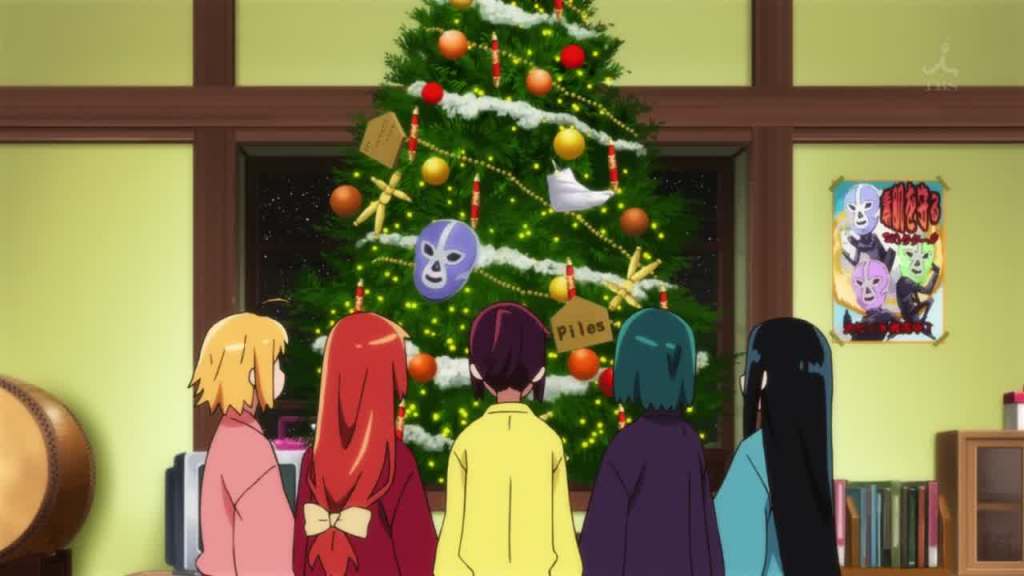
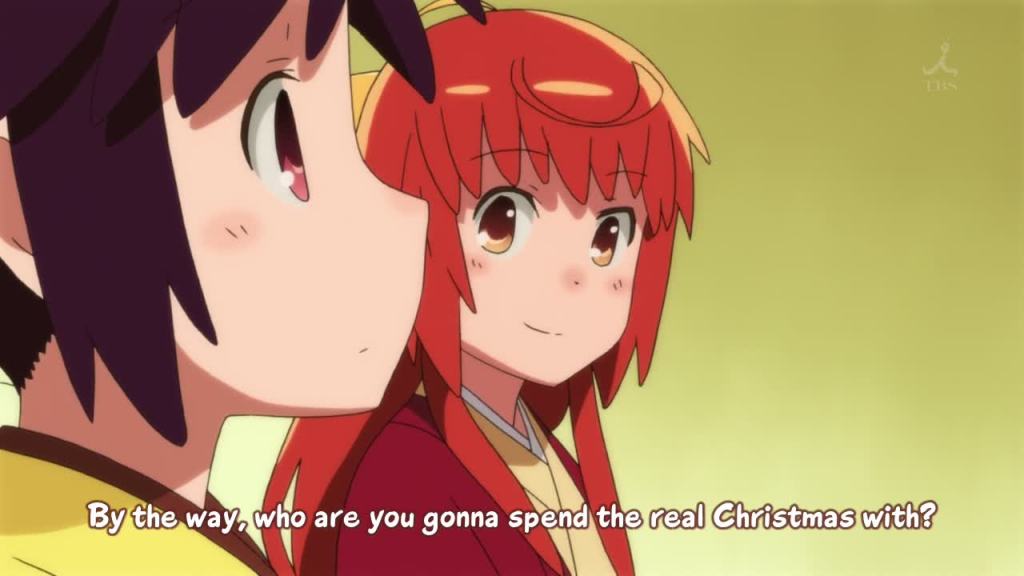

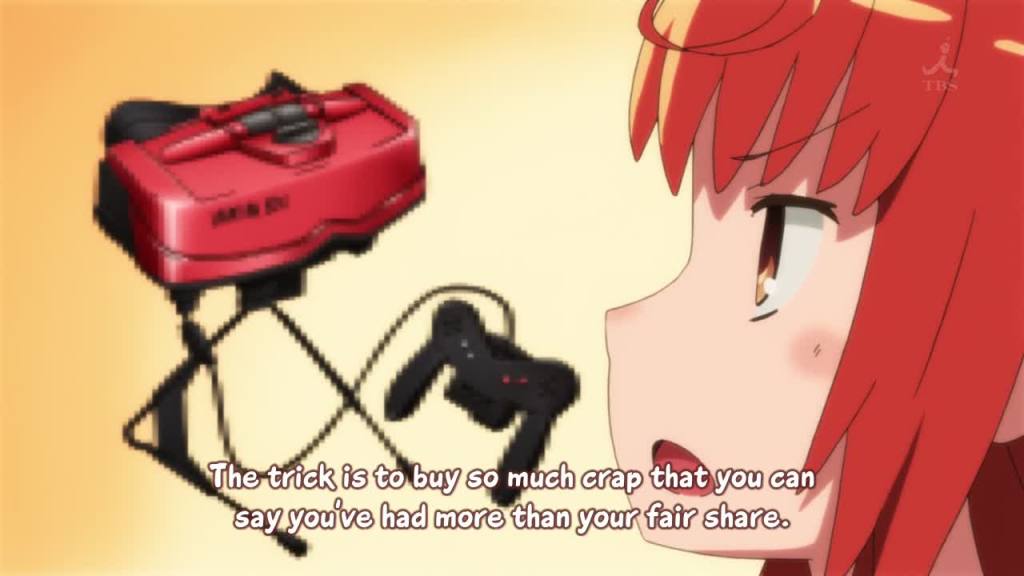






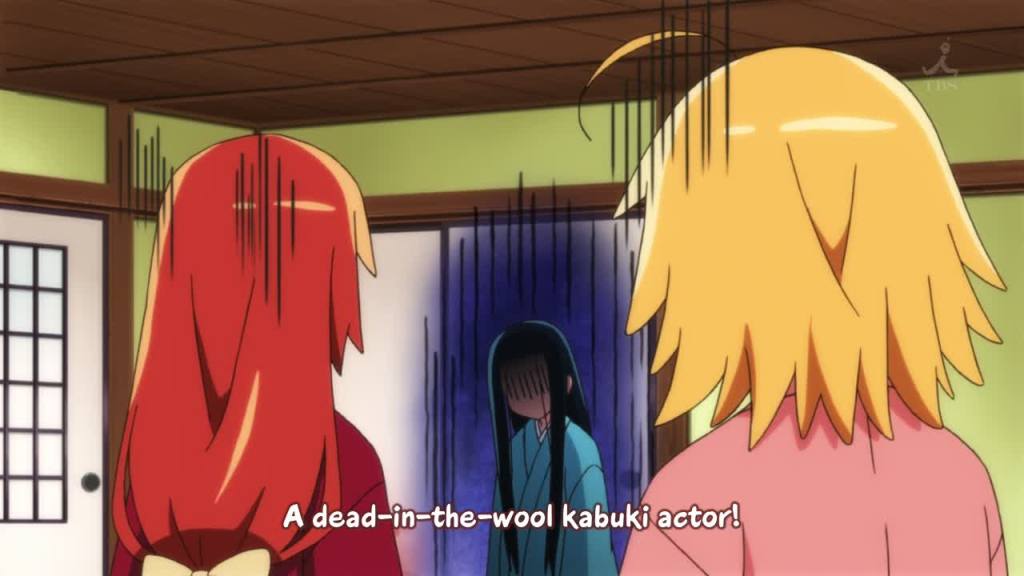
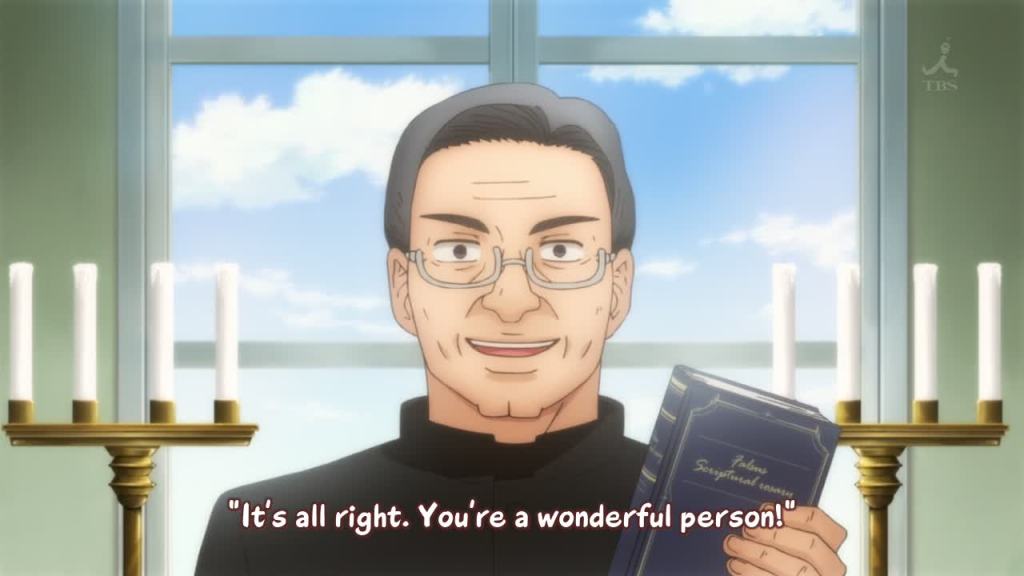

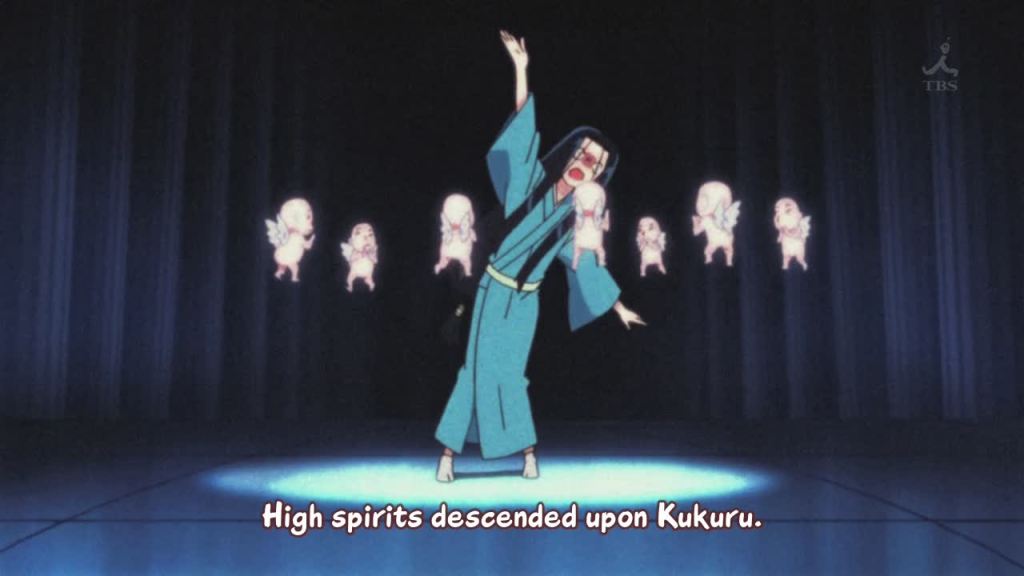









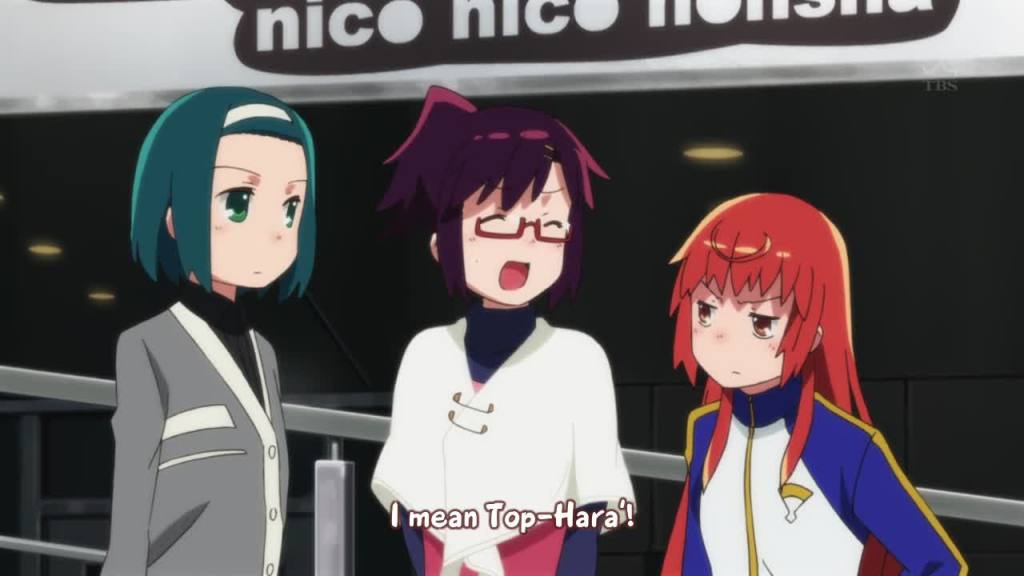








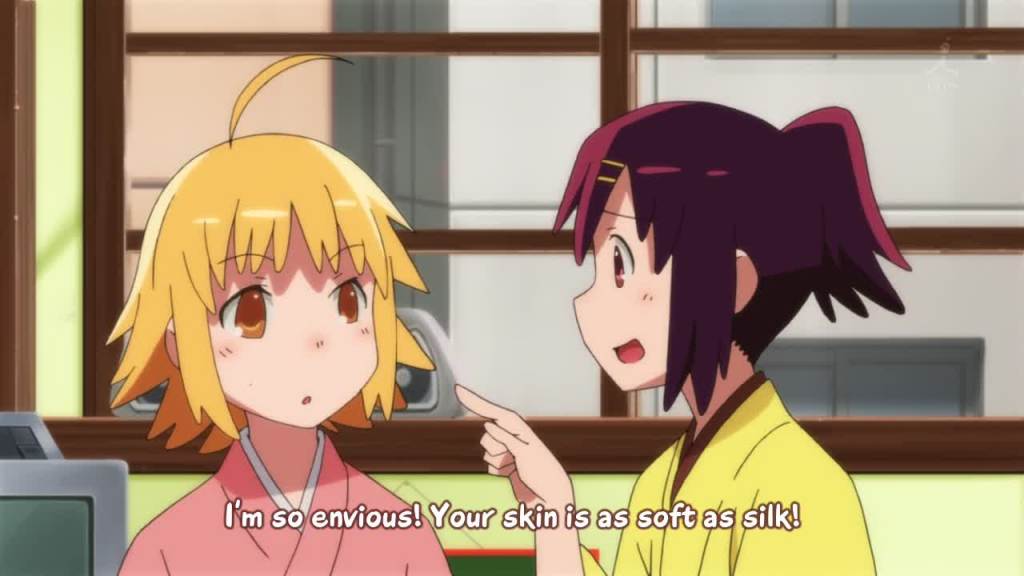

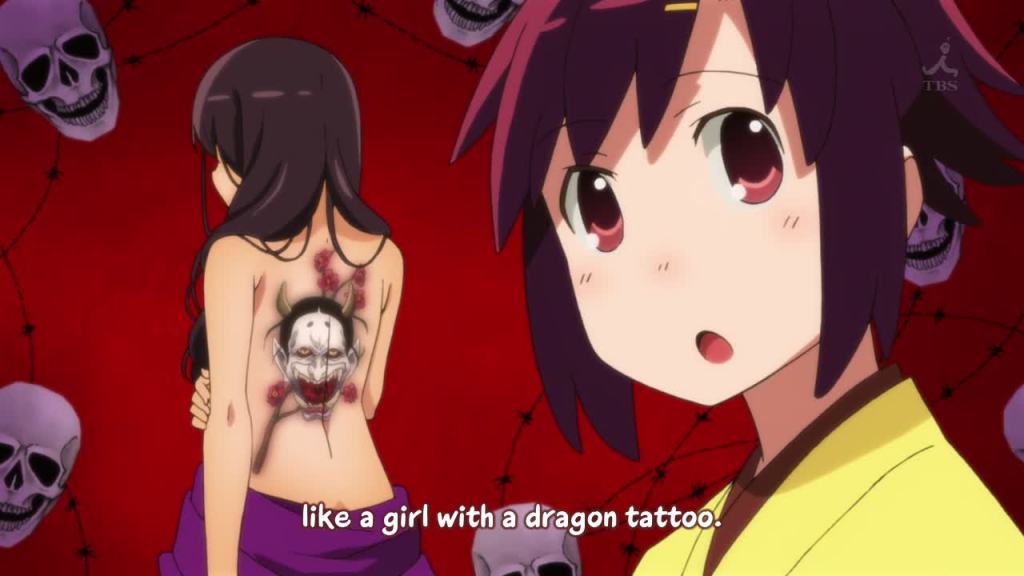

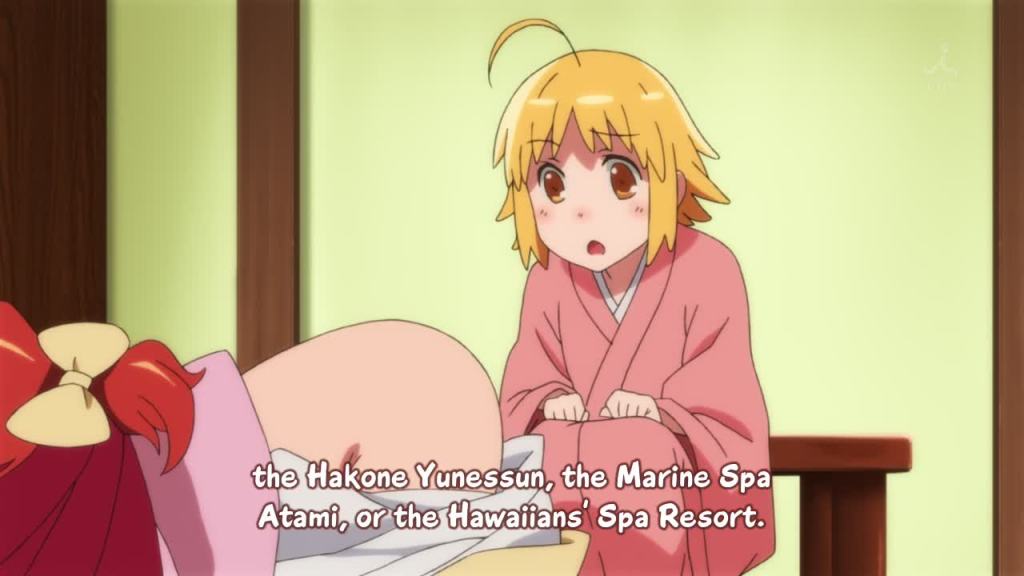

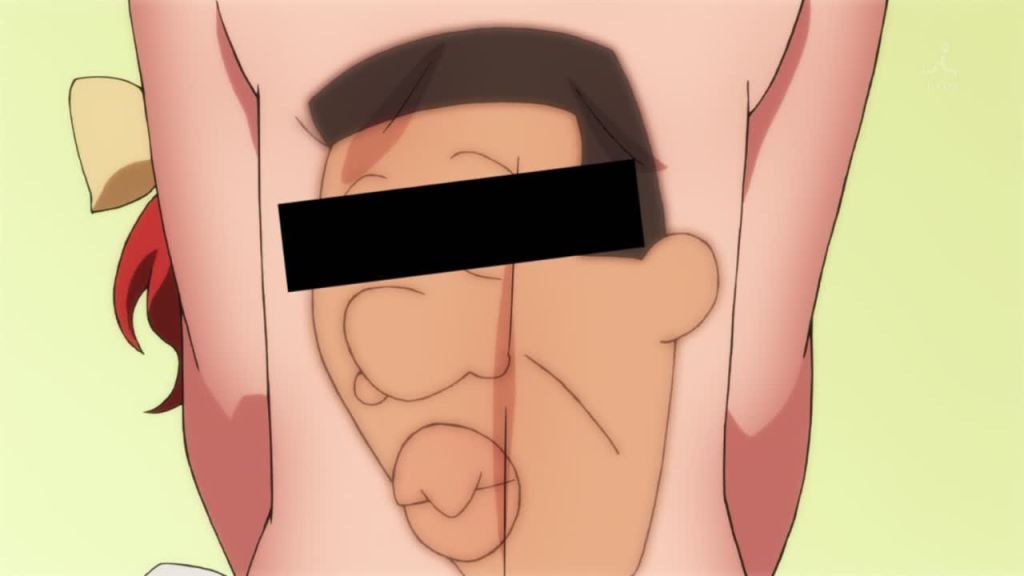
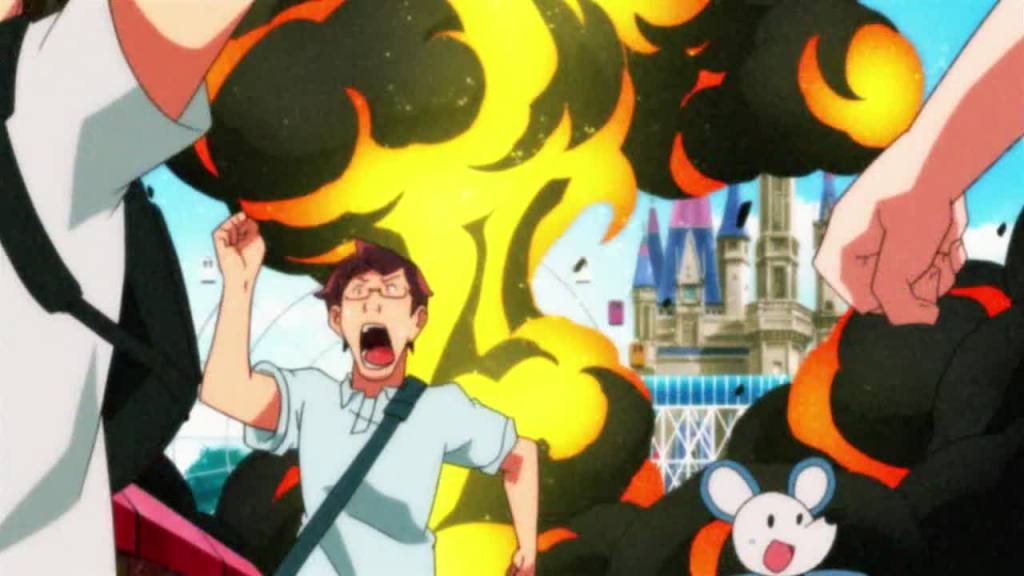
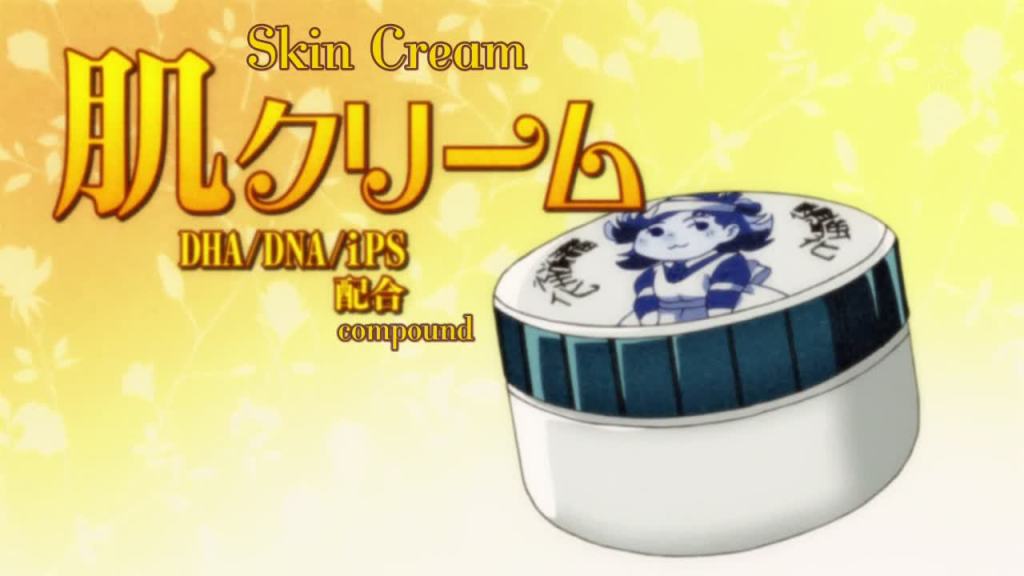
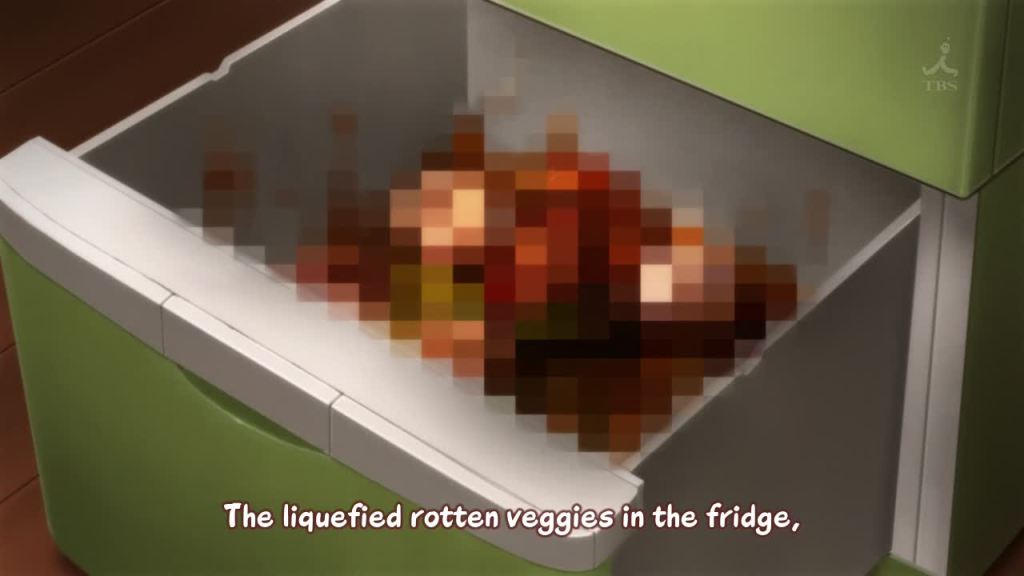

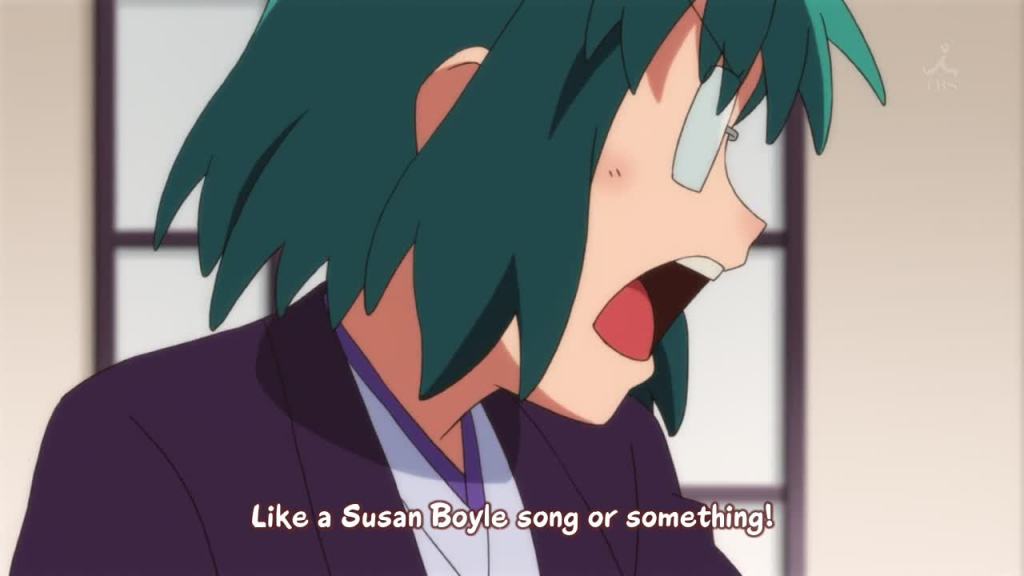
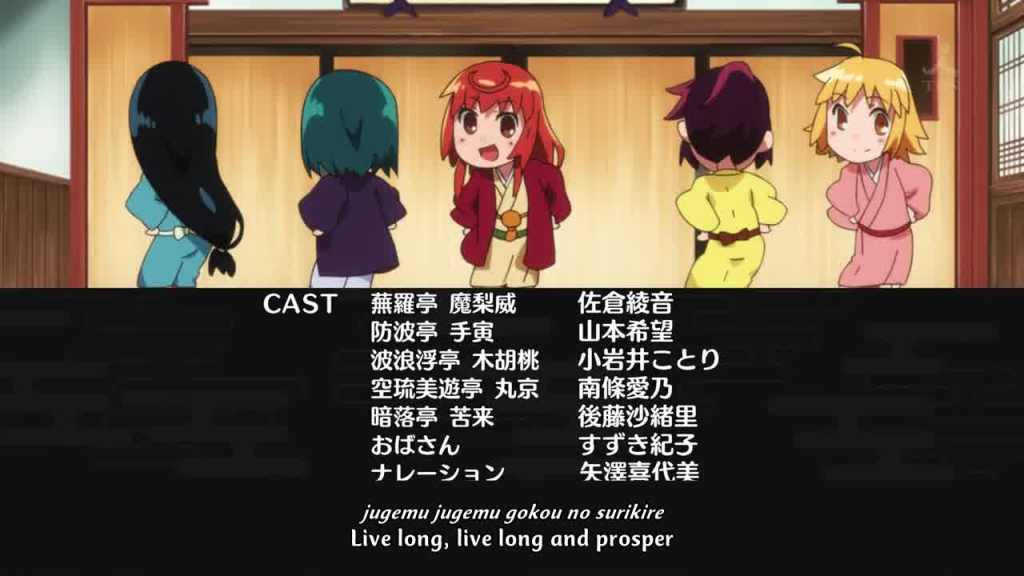
Thanks for subs and notes, you’re great.
I thought that that anego and tattoo thing was a yakuza reference.
Thanks a lot for your hard work!
can you tell me the meaning of ” dead-in-the-wool “?
Intentional depressing typo of dyed-in-the-wool. If you don’t know the phrase, I suggest Wiktionary.
Thanks a lot!
Why didn’t you mention that the Japanese (usually the most conservative) think that eating in public is rude?
Aren’t things like icecream cones and crepes considered an exception to that rule?
Thank you very much for your hard work on this series.
Kigu’s crepe order and the resurrection spell might be a reference to Nichijou, but I might be wrong. ^^;
http://www.youtube.com/watch?v=kAzTxzEeptM
http://www.youtube.com/watch?v=J5t0iLqqgiI
Nope, Nichijou is referencing the same stuff as Joshiraku. Simple as that.
could you please tell me the meaning of “SR tapes”, does it mean a precise thing or it’s just a name?
Refers to the Sony HDCAM SR tapes, apparently used by JC Staff in the making of Joshiraku.
Thanks a lot and sorry for annoying you by questions, but if you excuse me. What is the meaning of “I’ll smear it on thick”?
It’s not “piikeegurume.” It’s “bii-kyuu-gurume/ B級グルメ” – “Second class gourmet.” The meaning is common local food.
http://ja.wikipedia.org/wiki/B%E7%B4%9A%E3%82%B0%E3%83%AB%E3%83%A1
Hoan is wrong. 浦安is Urayasu.
Kim Jonun visited Urayasu.
There is a Disneyland in Urayasu. xD
fix’d. thanks for pointing it out.
The music that plays in the tattooed girl scene is similar to the theme song of the first Battles Without Honor and Humanity (仁義無き戦い) movie.